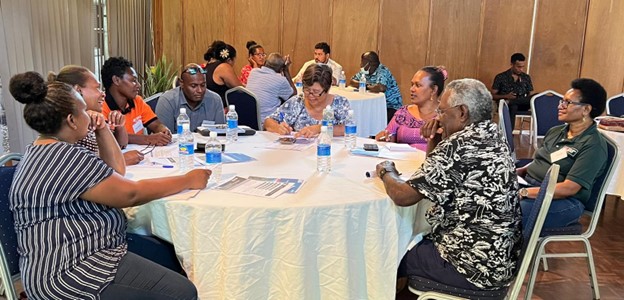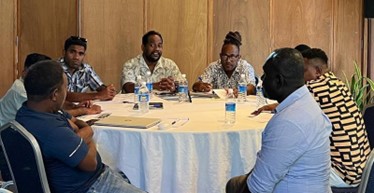US-SEGA Conducts the First Export Promotion Training with the Solomon Islands Chamber of Commerce and Industry
Nathan Associates, Inc. is part of Cadmus. Original publication date: October 21, 2022.

The US Support for Economic Growth in Asia (US-SEGA) is working with USAID Philippines, Pacific Islands, and Mongolia to implement Objective 1: Trade and Investment of the Solomon Islands Strengthening Competitiveness, Agriculture, Livelihoods, and Environment (SI-SCALE) program. US-SEGA continued its field mission to the Solomon Islands by leading a two-day training on regional trade agreements (RTAs) and trade finance and payment methods on October 4 and 5.
Working with the Solomon Islands Chamber of Commerce and Industry (SICCI), US-SEGA was able to engage several small and medium-sized enterprises (SMEs) that are exporting or soon-to-be exporting to ensure that local private sector companies are aware of mechanisms that can facilitate the exportation of goods. This training is the first of a series that will support local Solomon Islands companies to better prepare to market and export their agricultural products to external markets. US-SEGA and SICCI will roll out future trainings in the upcoming months.

The first day was attended by 26 learners and focused on RTAs. During this module, trainers learned the basics of RTAs and the benefits of specific agreements that the Solomon Islands are a part of, including the Pacific Agreement on Closer Economic Relations Plus (PACER Plus) and the Melanesian Spearhead Group Trade Agreement. Following the introduction to RTAs, the training covered how to practically navigate trade agreements to ensure exports qualify for and receive preferential treatment, such as how to identify each good’s harmonized system code, key documentations that are needed to export, and where to find tariff schedules. This module closed with an in-depth group exercise where the learners discussed which trade agreement(s) seemed most relevant for their product and which rule of origin would apply to them. 100% of the respondents to the post-training survey responded that the training was good or excellent. In addition, 95% of the respondents believed that the training was well-prepared, and 100% of the respondents believed that the training encouraged participation and interaction.
The second training was attended by 22 learners and focused on trade finance and payment methods. During this module, learners learned key aspects of payment methods available to Solomon Island exporters, such as documentary collections and letters of credit. Learners were also taught about foreign exchange basics, money laundering, and managing risks. This module also discussed value chains, their importance to SMEs and how to develop them. The module and the training concluded with a panel that focused on the realities of RTAs and trade payments, which further spurred discussion on the next steps and resources available for companies to improve their export-readiness. 100% of the respondents to the post-training survey responded that the training was good or excellent. In addition, 81% of the respondents strongly believed that the training was well-prepared, and 87% of the respondents strongly believed that the training encouraged participation and interaction.
About US-SEGA
The US Support for Economic Growth in Asia (US-SEGA) is a six-year project designed to improve the policy environment for sustainable economic growth and prosperity, improved regional economic cooperation, sound management of institutions and good governance throughout APEC and the Indo-Pacific, while also expanding markets for U.S. goods and services. In addition to strengthening the Asia-Pacific Economic Cooperation (APEC) forum, US-SEGA offers missions a flexible mechanism to respond quickly to new opportunities through targeted technical assistance and training. It particularly supports workstreams focused on current and emerging economic growth issues including digital economy, workforce development, supply chain connectivity, and women’s economic empowerment. The program also supports missions in their ongoing response to the economic effects of the COVID-19 pandemic.
US-SEGA is managed by USAID’s Asia Bureau with partial funding and strategic direction from the U.S. Department of State.